ENOCH STEPHEN – Kano
With a heap of trash in his truck, exhausted and hungry, he stays under a Dogon Yaro tree to cool off from the scorching sun.
While he awaits his Fura da Nono, (a street snack) he counts his gains for the day.
Notwithstanding the possibility of contracting various diseases from the noxious smell emanating from waste, Iliya Babangida a youngster (Unaware of his age), is among the informal waste pickers in Kano who walk around various locations in the state in search of waste from people for disposal, in exchange for money. Kura (a locally constructed two-wheeled truck) is what is used to package various refuse he collects, just like other waste pickers.
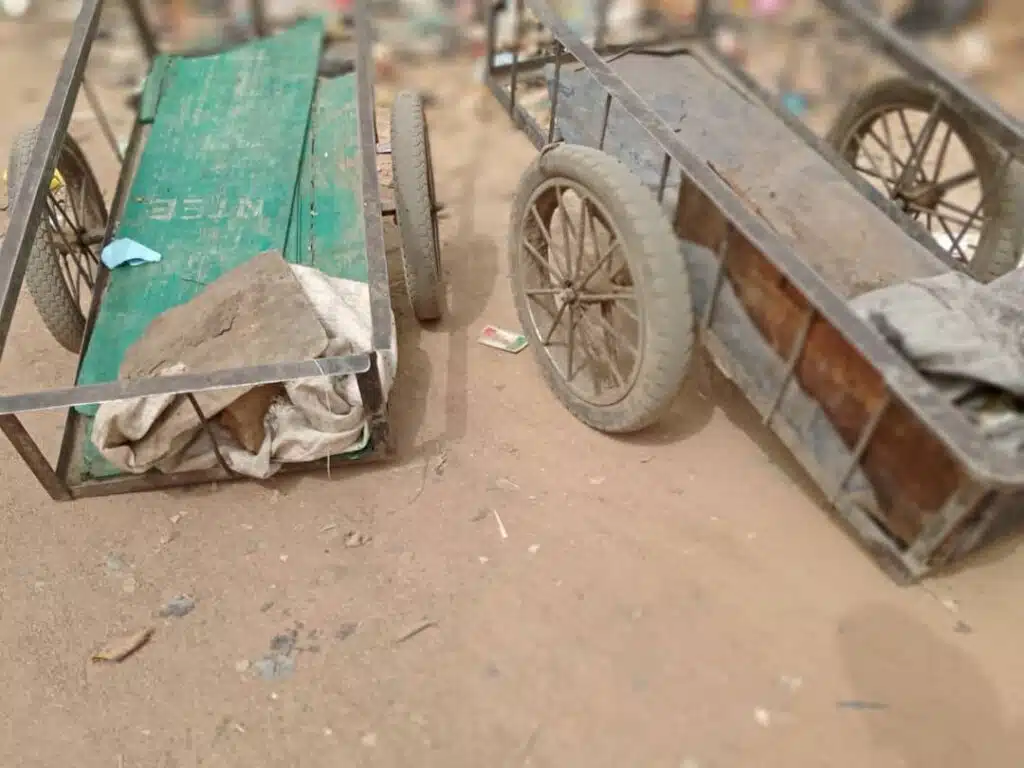
Iliya hails from Bauchi State but was sent to Kano State by his parents, in search for Islamic Knowledge.
He resides in Kwana Hudu, a run-down neighborhood within Brigade, in the State Like other almajirai who pick garbage for money, he has equally chosen waste picking as a job in order to feed himself and cater for his daily needs.
Read Also: Consumer Rights Day: How experts strategize to tackle plastic pollution in Kano
“My parent stays in Bauchi and I was sent here to acquire Quranic knowledge. I work on Thursdays and Fridays from about 6:30 am to 1:20 pm in order to get some money to buy food and to clothe myself because I’m responsible for catering for my needs” he said, looking downwards.
“I earn between three to four hundred naira daily, which takes me for the week. For a small basket of waste, I charge about twenty naira, while bigger ones cost about fifty to a hundred naira, depending on the volume.
Whenever I pack so much waste, I could earn up to one thousand naira in a day. When my truck is filled up, I dispose of the waste in a large dumpsite in Yan Balangu” Iliya added.
Irrespective of the diseases he is at risk of contracting from various garbage, Iliya’s major concern is making money to feed himself and cater to his needs.
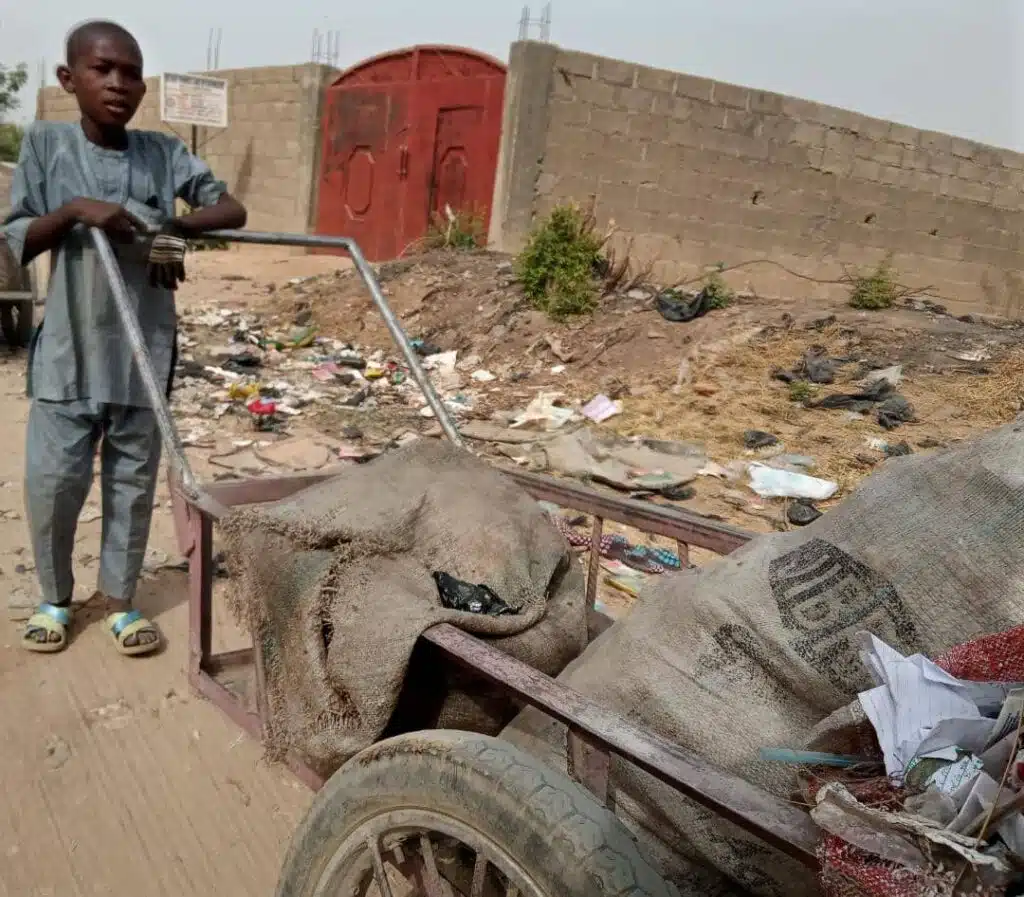
Street begging, not an option.
With sweat dripping down his forehead, rolling down his cheeks, Mohammed who is unaware of his age but thinks he is fourteen years old pushes his truck to a nearby canal to dispose of the waste he has collected from various customers.
He is shy about giving information about why he resorted to dumping picking but finally opens up when his partner stops by to dispose of refuse from his fully loaded truck of waste.
Unlike Iliya whose parents are in Bauchi, Mohammed lives in Kano with his parent and his siblings, who are fifteen in number.
According to Mohammed, begging isn’t an option for him, as so many factors pushed him into dump picking.
“Begging on the streets makes people look at me with disrespect and sometimes they even shout at me asking if I can’t work like my mates rather than beg for alms. It made me feel sad and it forced me to dump picking for money. We are very much in my family and my parent cannot provide me with what I want which is why I am doing this to make ends meet.
In a day I make about three hundred naira but some days, might not be so productive. After morning prayers, I start working from as early as 6 am in the morning till late in the afternoon. Mohammed explained.
“There are people I know of, who have had horrible experiences from begging by the roadside, in traffic, and from house to house. I don’t want that to happen to me, which is why I am always on the street every day, in search of people who I will collect refuse from, for money” Mohammed said, as he hurries to dispose of his dump in a nearby canal.
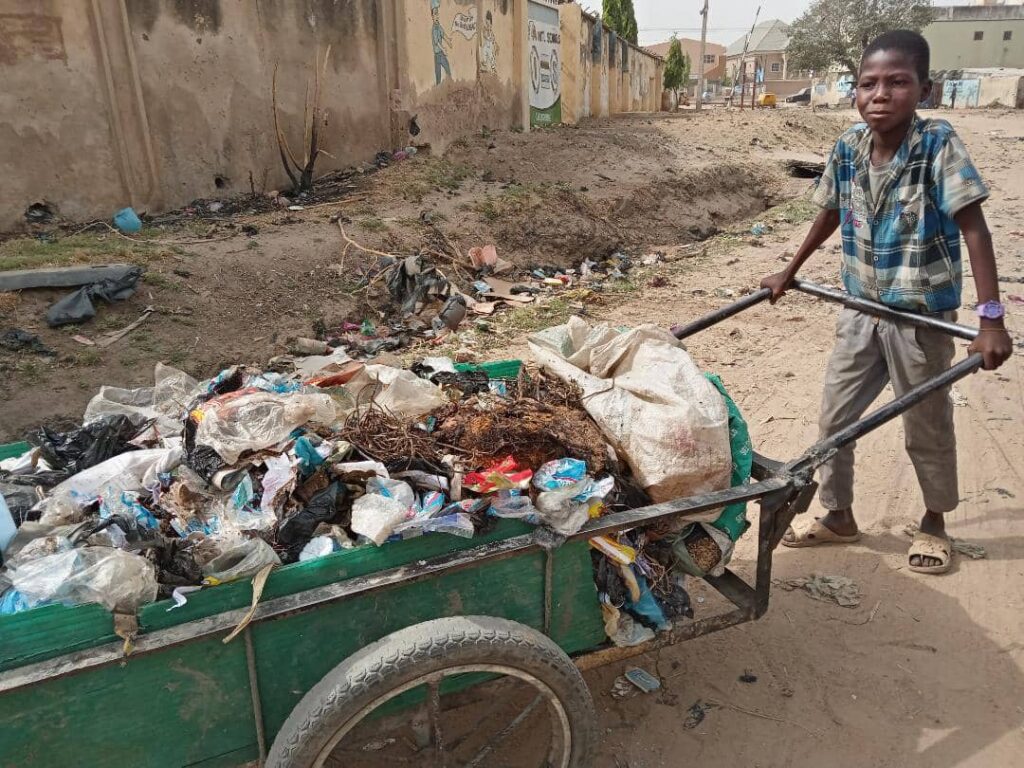
Usman Salisu is fifteen years old, and he started dump picking at the age of 11.
He was fed up with begging for alms, as the money he got was either meager or was at times rejected by people whenever he pled for money from pedestrians or seemingly opulent individuals.
Usman is also responsible for catering to his needs and doesn’t fancy street begging just like Mohammed.
“I started picking refuse four years ago and it’s because I needed money for food. I have to pick refuse every day and I go out as early as 6 am in the morning when everywhere is clear and I work till I have enough money for the day or I stop when I get tired. Sometimes when my brothers don’t have money, I take out of my money to buy food for us. My friends also do the same whenever I don’t make much money to buy me food whenever I go out” Usman said.
According to UNICEF, the consequences of child labor are staggering as it results in extreme bodily and mental harm. It could lead to slavery, sexual or economic exploitation. It also cuts children out of school, healthcare and also restricts their fundamental human rights.
At the early age of eleven, Usman took the responsibility of catering for his needs and sometimes cater for that of his siblings whenever they don’t make money from the various odd jobs they engage in to earn a living.
Surviving by scavenging valuables from dumpsites
After collecting refuse from different households and either disposing them into a canal or a larger dumpsite, some informal waste pickers are specialized in scavenging valuables from the refuse in which other waste pickers have dumped. They survive by sifting leftover valuables from trash and sell, in exchange for money.
Mohaman, who doesn’t know how his name is spelled, doesn’t have a surname, or is even sure of how old he is, hails from Jigawa state. He is an almajiri (about 15 years old) who was brought to Kano in search of Islamic education and to also seek greener pastures for himself. He goes around major dumpsites around Fagge Local Government in search of valuables that he could sell to make money for his daily needs.
“I am an almajiri, and I have to work to feed myself. Life in Jigawa is different from Kano. Even though I attend my Islamic school, I still move around dumpsites to pick up metal so I can sell to people who need them to make money for myself and I do this every day” Mohaman said as he hesitates to leave for bigger dumpsites.
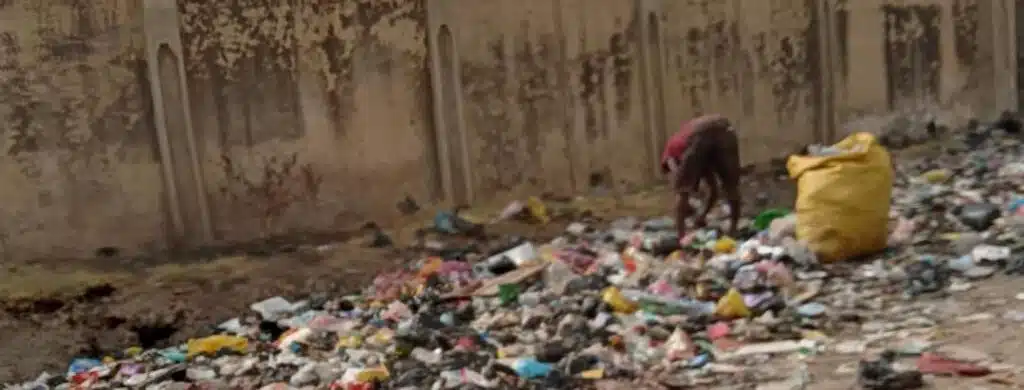
“I take the metals to get to the garage and sell to mechanics and they give me money, based on how much valuable things I can offer them” he added. Mohaman is an only child to his mother who resides in Jigawa State, doesn’t have siblings, and scavenging valuables from refuse is how he survives in Kano.
It about 3 pm in the afternoon, on a very sunny day. AuduAbdullahi who has become an expert dump scavenger is profusely sweating and is seriously searching for valuables in a dumpsite around Zungeru Road. He doesn’t mind getting pierced by sharp objects, as he uses his bare hands to scavenge the dump.
Just like Mohaman, Audu is also an Almajiri who has chosen dump scavenging as a means of livelihood, at the tender age of fifteen. He is an indigene of Kano state, and unlike Mohaman who specialized in picking metals from dumpsites, he is diversified as he picks metals, bottles, sachet water nylons, and other things he considers valuable. He sells them just to survive the hardship that has been laid on him.
“I go to both big and small dumpsites at 4 pm in the evening. I do this because at that time the dumpsite would be full with so many refuse and that will enable me to get plenty valuables which I sell to people. The more valuable items I can get, the more money for me” Audu explained as he breathes heavily.
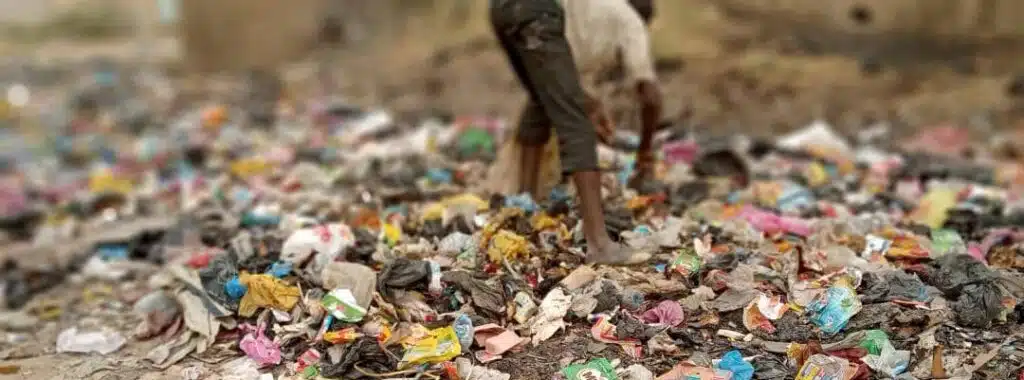
“I attach a magnet to my bag whenever I set out to different dumpsites so that it could attract metals I fail to discover. My parent lives in the village and I was sent to the city to join an Islamiyya (Quranic school). With the money I make, I’m able to survive this hardship” he said. Audu’s parents reside in a village in Dambatta LGA, Kano.
Mai Shara contributing to environmental pollution& the way out
It is no longer News that informal waste pickers indiscriminately dispose of waste into drainages, canals, or even beside major roads and streets in Kano, thereby causing environmental complications and also frustrating the effort of the Kano State Refuse Management and Sanitation Board (REMASAB) in managing waste.
The question to ask is “does REMASAB have formal waste disposers who collect waste in residential areas?
Ms Damilola Makinde who works at Jaba in Kano state said she patronizes informal waste pickers due to the absence of Formal waste pickers. “For many years now, I have been paying Shara Boys (Informal waste pickers) to dispose of my refuse because they are my only option for disposing of my waste because REMASAB doesn’t come to our area to collect our waste”.
It is important to note that the Lagos State Waste Management Authority (LAWMA) a similar agency as REMASAB makes use of waste disposal trucks that go around neighborhoods to collect waste for proper disposal, with people paying the waste collectors.
If a similar method of the waste collection could be adopted in Kano, informal waste pickers would be gradually fading away and issues such as environmental pollution as a result of informal waste pickers would fade away. Moreover, adopting this method will also boost the government’s internally generated revenue (IGR), as Kano state produces one of the largest waste in Nigeria due to its large population. If this can be actualized in the state, another question would be how the informal waste pickers would survive hardship because apparently, they would be put out of the waste business.
From all responses Daily News 24 gathered from the Informal waste pickers, a corresponding fact is that all of them have never had the opportunity to formal education, due to hardship.
According to Radwan Chowdhury, CEO of McWeadon Education and founder of AA Global Solutions, “Education is the best way to end the cycle of poverty and exploitation of children”.


